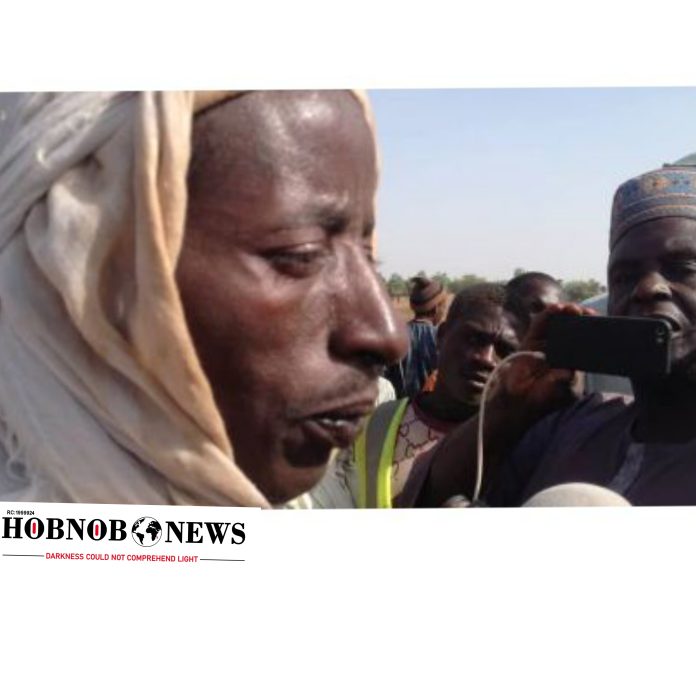Repentant bandits in Kaduna State have expressed their commitment to a peace pact recently brokered by the state government. This assurance was made to Governor Uba Sani and National Security Adviser Mallam Nuhu Ribadu during a reconciliation process aimed at ending over 12 years of violence in the region.
The bandits, who had terrorized communities in Birnin Gwari Emirate, Buruku, and Sabon Birni, voiced regret for their past actions and pledged to lead law-abiding lives. They requested government support to reintegrate into society and allow their children to access education.
A Fulani elder representing bandit leader Yellow Janbross and community leader Ardo called on Fulani leaders nationwide to urge their communities to embrace peace. Speaking in Birnin Gwari, he stated, “They should follow the Kaduna example and lay down arms. We are grateful for this peace pact and shall continue to pray for its sustainability.”
Another repentant bandit, Alhaji Ibrahim Bokolo, who fled to Niger State during the crisis, appealed for understanding from local vigilantes, urging them to avoid actions that could jeopardize the peace process. “Now that I have returned to Birnin Gwari, I hope for more understanding and cooperation,” he said.
Muhammadu Lawali, another ex-bandit, expressed optimism about the agreement, highlighting its genuineness compared to past attempts. “This peace pact is different because both sides are sincere. We pray for forgiveness and urge more love and unity between Fulani and Hausa communities,” he noted.
Suleiman Yes Power, another reformed bandit, shared his joy at being able to sell cattle at the reopened Birnin Gwari market, a privilege unavailable for years. Displaying his earnings, he remarked, “I am happy to see the market revived and pray for sustained peace to boost economic activities.”
The Kaduna State government, alongside federal agencies, initiated the “Peace Dialogue Group” to foster dialogue and maintain peace. This initiative has seen senior bandit leaders and their followers surrender arms and embrace reconciliation. Additionally, the state established a Peace and Reconciliation Committee comprising stakeholders from government, Fulani, and Hausa communities to address potential conflicts.
The peace efforts have already yielded positive outcomes, notably the reopening of the Birnin Gwari cattle market, which had been closed for over a decade due to insecurity. The market, a hub for economic activity, now sees over 50 trucks loaded with livestock departing daily. Similarly, the grains market has experienced a resurgence, with farmers clearing land for the next planting season.
Yusuf Ibrahim Jonga, a trader at the grains market, expressed gratitude for the efforts of Governor Sani and NSA Ribadu. “We are enjoying peace and harmony. Business is booming, and we can now move freely and interact with our Fulani brothers,” he said.
Sarkin Zango Birnin Gwari, Hambali Muhammad, who oversees the cattle market, highlighted its significance. “This market was dormant for over 10 years. Today, we have seen over 50 trucks leave with livestock. All praises to Almighty Allah,” he remarked.
Farmers in the region have also welcomed the peace initiative. Malam Mustapha, a local farmer, shared his excitement about returning to previously inaccessible farmland. “During the crisis, we couldn’t plant in some forested areas. This year, we plan to cultivate these lands,” he said.
The peace accord has improved transportation and trade, with the Birnin-Gwari-Lagos Road now open 24/7, ensuring the seamless movement of goods and people.
District Head of Sabon Birni community praised the initiative, noting its transformative impact on the region. Similarly, Danmasanin Birnin Gwari, Alhaji Zubairu Idris AbdulRauf, expressed hope that the model could be replicated nationwide. “This peace pact is a model for other parts of the country. We are committed to its success,” he stated.
The Chairman of Birnin Gwari Local Government, Salisu Isah, attributed the progress to Governor Sani, NSA Ribadu, and other stakeholders. “We prayed to God, and in His wisdom, He granted us peace after 12 years of turmoil,” he said. Isah assured residents and investors of sustained peace, expressing optimism about the region’s potential to become an agricultural hub for Northern Nigeria.
He also revealed plans to repair damaged telecom infrastructure, with some providers already resuming services. “Talks are ongoing to restore telecom masts destroyed during the crisis,” he noted.
The peace pact marks a significant milestone in Kaduna’s history, offering hope for a peaceful and prosperous future. Local leaders and stakeholders remain committed to sustaining this hard-earned harmony.

